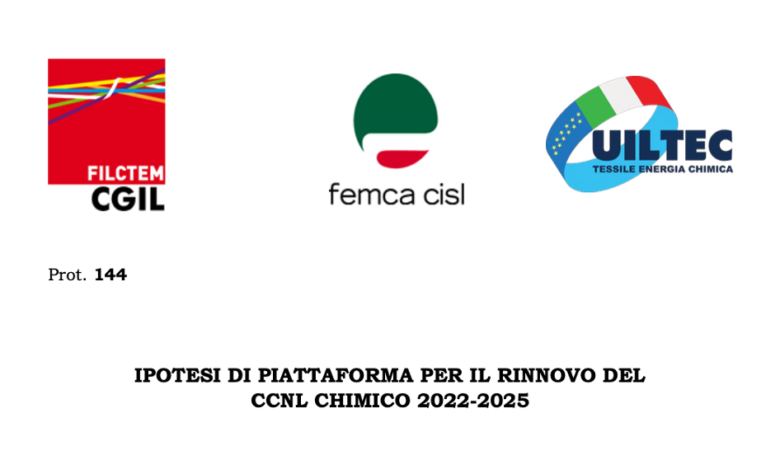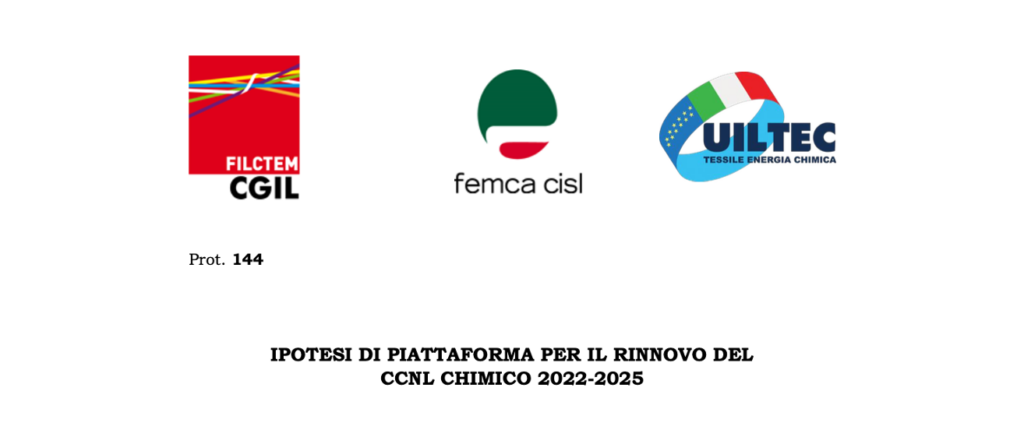
We report the hypothesis of the Platform for the Renewal of the CCNL: Hypothesis CCNL chemical platform. The current CCNL will expire on June 30, 2022
 FILCTEM CGIL, FEMCA CISL and UILTEC UIL jointly launch the renewal phase of the National Chemical Work Contract, for the chemical, chemical-pharmaceutical, chemical fibre, abrasive, lubricant and LPG sectors, after the formal cancellation delivered to the employer parties in recent days.
FILCTEM CGIL, FEMCA CISL and UILTEC UIL jointly launch the renewal phase of the National Chemical Work Contract, for the chemical, chemical-pharmaceutical, chemical fibre, abrasive, lubricant and LPG sectors, after the formal cancellation delivered to the employer parties in recent days.
The methods contained in the CCNL in force and in accordance with the provisions of the process established by the Unitary Regulation prepared by the National Secretariats for the involvement of members and workers, their company representatives, union structures at all levels, and as required by the Interconfederal Agreements in matters of representation and bargaining.
Premise
No one could have imagined a scenario like the one experienced with the Covid 19 pandemic which has imposed a great sense of responsibility and has seen union representatives at various levels play a fundamental role aimed at preserving the health of male and female workers in a context, which even during the most critical phase of the lockdowns, guaranteed the continuation of activities in many areas of the sector. The economic impact in that phase was devastating and did not spare the Chemical and Pharmaceutical industries. During the recovery period, a recovery was noted of a large part of the gap in production levels, now threatened by other macroeconomic factors which are holding back a substantial revival of the sector. An example are the energy costs, in particular of methane gas, which have soared in the last months of 2021 to which is added the reckless increase in the cost of CO2 emissions (ETS system), a factor amplified by the financial speculation currently underway on this interchange system vital for business continuity. In this context, constant discussions with the counterparts were maintained to monitor the evolution of the problems and to outline an action plan that the scenario of transformation of the business system imposes on the world of work. This new scenario is strongly influenced by the energy transition and by the innovations introduced by digital technologies which will require particular attention for this contract renewal. The pandemic has given a strong acceleration on the issues of carbon neutrality and the commitment of companies towards the identification of production processes based on the reduction of emissions, the circular economy, recycling and the use of biomass and risks marginalizing the value of basic and traditional chemistry by paying the highest price.
The transformations that the new environmentalist culture is rightly supporting involve global political decisions which, if not correctly addressed and updated, will put the leading products of our chemical system out of the market due to authorization complexity and costs. Innovation, transformation, redesign of production processes require an employment balance that may not be guaranteed by the times with which to govern the transition path. In this sense, the value of the participatory model of union relations must be made explicit through the management of a just transition that combines production and employment with the necessary innovation.
In 2020 we signed an agreement with Federchimica and Farmindustria called "FOR Working" which opened up the experimentation of new organizational models. An example of the work that has the objective of developing, in the renewal of the National Collective Agreement, all the guidelines useful for directing effective company bargaining for the challenges of innovation and providing us with an adequate text to face this delicate transformation phase.
The platform for the renewal of the National Chemical Contract therefore intends to address these issues:
Industrial Relations
On the subject of Industrial Relations we confirm ours strategic objective which sees a fundamental role of worker participation to the choices of the company, also through a substantial advancement of the committee for the corporate economic scenario to favor and encourage concrete company agreements of widespread shareholding and the establishment of Supervisory Committees that are able to enhance the organized participation of workers in the life of the companies.
To consolidate and develop an Industrial Relations model that characterizes the sector, various tools are actually proposed through the implementation of the CCNL disciplines:
- the concrete implementation of the measures identified by the CCNL as a key means for the development and enhancement of the so-called "good practices" also implemented outside the close corporate and entrepreneurial relationship; in this sense the days of the itinerant territorial observatory must be recovered which obtained good results of participation and comparison in recent years, forcibly interrupted by the health emergency.
- guide behaviours; especially defining contract address settings to aid contract development and direction corporate, an essential engine of innovation processes and of the challenges that await us for the coming years.
These objectives are deemed to be pursued also through the bilateral bodies contractually envisaged by the constituent parts starting from the aforementioned national and territorial Observatories as well as in the qualified development of corporate ones, as well as through Fonchim, FASCHIM and OBC, which must see an active and guiding role towards the topics dedicated to them.
National observatory of the chemical sector, pharmaceutical observatory and corporate observatory
The CCNL of the chemical-pharmaceutical sector is known for the centrality and importance of participatory industrial relations, underlines the need to develop the skills of the negotiating actors on the application of the CCNL, the related trade union agility and facilitate the use and knowledge of the text of the CCNL also with the use of digital tools.
The Pharmaceutical Observatory for the evaluation of the specificities of the sector, on the other hand, has yet to take decisive steps towards the qualification of a more punctual exchange in a sector undergoing strong transformation which needs to deal specifically with the various sectoral issues such as the scientific information of the drug which is undergoing particular organizational and professional evolutions.
Company Observatory. With respect to the latter site, the CCNL introduces in article 46 the obligation, for companies with at least 50 employees, to establish one. It is a non-negotiating body, but which, compared to large groups, struggles to take shape. Being established with the shared objective of consolidating a relationship model that characterizes the sector at all levels, today it is necessary to carry out a check on its diffusion, as well as on the quality expressed within the corporate relationship system, also for a its possible strengthening.
Job market
The methods for introducing new resources into companies, with flexible contractual forms, must be rethought in the light of the rules introduced by the "Dignity Decree". A careful check must be performed on the art. 3 Types of Employment Relationships, in particular in point B of the Fixed-Term Contract and in point C Administration Contracts. Furthermore, these integration paths should be tackled with a participatory approach, the cornerstone of this contractual model, with the objectives of "change management" including generational.
Training and new skills
Training in this context is increasingly strategic and essential as well as a structural part of work and the enhancement of people's skills and therefore of their employability. The claim and enforceability of the preventive comparison for the sharing of training plans must be consolidated and strengthened, in addition to the need to make up for the delays with respect to the figure of the training delegate who has not yet taken hold in a widespread way in the associated companies. Delay also caused by a limited number of realities that have provided specific training modules for the Training Delegate, despite being contractually envisaged.
Skills and Competences requests to workers in the sector in managing new models, starting from the use of big data, from the R&D area, passing through production in the strict sense, up to the marketing and commercial aspects, which require punctual insights and clarifications in the various specificities of the sector.
On an organizational level, the benefits listed can only be implemented and increased if accompanied by a transition also in the field of organization and training of the worker. Indeed, the management, learning and application of the multiple innovations in the sector require:
- skilled labor;
● training;
● performance and organizational flexibility;
● interdisciplinary teams and participatory organizational models; ● closer supply chain relationships;
On the one hand, it is emphasized that the sector is already made up of a highly qualified workforce due to the very nature of the products handled. At the same time, it is also the sector that invests most strongly in training. Despite this, certainly a positive fact, a reflection on the technical training and broader training in various business contexts which, following the changes in the digital transition and towards sustainability policies, mean that the technical knowledge acquired with traditional training or within the company is no longer sufficient.
This aspect is critical in a sector such as the chemical one where the technical contents are historically central and the staff has always been rightly considered one of the success factors of the company and its competitiveness. Consequently, continuous training will assume even more importance, understood more and more, at the same time, as a right and a duty for the worker, to be noted also at national level through a declaration expressed in the CCNL for an adequate training strategy (strategies of life -long learning; reskilling; upskilling).
Even in the face of this context, the certification of training activities assumes ever more importance that the CCNL will have to fulfill, making it certain and punctual, both on training activities for enhancement and professional retraining so that they can also be combined with active institutional policies.
For this reason it is necessary to activate within the sectoral training bilaterality (OBF) a mechanism for the collection of suitably certified specific skills, constituting a real meeting place for "demand" and "supply" of the needs of the sector which can be a useful tool in moments of corporate restructuring but also in the development and growth of companies.
Work organization, flexibility, rights and protections
It is underlined how the issues dedicated to digital, smart-working, smart working, are imposed today as structural topics and therefore a fundamental part of collective bargaining, as more generally of the ongoing transformation process.
Organizational flexibilities will be decisive in the coming years to govern the technical-productive changes and transformations in order to increase company efficiencies and competitiveness together with professional skills, these should be better highlighted in the guidelines on bargaining and subsequently in the verification of classifications.
It is inevitable to remember how the health emergency from Covid-19 has profoundly transformed what was the traditional panorama of face-to-face work in the company. Digital tools capable of supporting work organization, allowing the remote control of some activities and access to company data and information even outside the office, have become an ally for companies to carry on business operations during the pandemic period, but are now becoming a structural element of corporate organization reform, which therefore requires interventions also in terms of job evaluation, working hours, training, safety and health of the worker.
The connection between these themes, their application in the company and the concrete effects for the worker are one of the challenges to be met.
On the one hand, the CCNL must play a guiding role in company policies, and at the same time enhance company bargaining.
Even in activities where the irreplaceability of the direct relationship is declared, as inscientific drug information, we are witnessing a profound transformation with the ever more massive introduction of digitized tools and activities which, if on the one hand can favor a greater diffusion of information, on the other hand reveal a tendency to consider the informant as a marketing terminal figure.
If the profound structural transformation of the pharmaceutical sector that we have experienced in recent years does not allow hypotheses of a return to an outdated context, today there is an increasing need to address the issue of the role of scientific drug information in the contractual context, so that the introduction of new technologies and ways of carrying out the activity does not distort its role which must instead be valorised.
It is necessary that the contract, also in the light of the recent national protocol on the subject, give a structural definition to the Smart-Working system as well as the FOR Working as envisaged by the agreement of 9 July 2020.
Classification
With the profound transformation processes underway, from digitization to the circular and green economy, new professional figures are emerging that today it is not possible to codify in the system of current professional profiles given the heterogeneity of situations and experiences. It is therefore necessary that, in a transitional phase, this issue, relating to the new profiles, professional contents and classification, be developed by negotiation at company level, highlighting it to the National Observatory.
Diversity and Inclusion
Gender-based violence is a commitment promoted by the previous renewal, but company bargaining struggles to formulate precise commitments through specific protocols aimed both at combating violence and harassment in the workplace and policies on the issue of diversity. The need therefore arises to define intervention guidelines so that these issues can effectively be addressed in the context of company bargaining.
Instruments relating to Part-Time are required, which will be accepted, among others, in the cases of care of the more married partner or relatives up to the second degree even if they do not cohabit with the applicant suffering from serious pathologies pursuant to Law 104/92.
Health, Safety, Environment
The main road is to promote the participation of workers in the daily construction of safety in the company. The goal is simple: it is necessary to overcome the widespread mentality that identifies those who have to deal with the issue as "those in security". The fundamental truth must be perceived: everyone is responsible for safety: all levels, all departments, everyone present in the company, direct employee or in contracting activities.
We therefore request that:
insert an initial synoptic framework that contains the main tools for the RLSSA:
- RLS numbers
- Hours of Leave
- Hours of Training
- Support website
- ACGIH tables
- Etc.
The appropriate tools for involvement will be defined at company headquarters (general assemblies, department meetings, meetings for specific groups, discussions on near-accident episodes, etc.), with at least annual calendars and deadlines
(Responsible Care, ISO 14001 and ISO 45001, with the involvement of both the preventive and during the implementation of the initiatives, of the RLSSAs).
Increase Training for all workers beyond the legal minimums, at least two hours annual meetings to explore safety, health and the environment, also using the resources of the Fondimpresa training account, involving the RLSSAs (and training delegate) in the choice of insights and during the training itself (reiterating that Fondimpresa resources must not be used for mandatory SSA training).
Create a section of the Corporate Observatory (as required by 46 of the CCNL) dedicated to the topics health and environmental safety, with the presence of the RLSSA and RSPP (and ASPP), this observatory could be the promoter of participation initiatives.
Define a permanent coordination among all RLSSA and RLS, both of the client and of the contract, providing for this activity, both hours of leave (to be included in the contract), and the methods to be defined within the company for its implementation.
In the big realities to foresee a regular coordination of the various RLSSAs of the group (headquarters, plants, warehouses, etc.) at least annually, for a positive exchange of experiences.
Welfare
The last renewal recalled the bilateral solidarity fund TRIS (protection, requalification, innovation, support), envisaged by the joint notice of 14 February 2018 and intended as an important tool of social responsibility in the context of the comparison of the needs for organizational innovation and generational turnover at company level. The entire contractual term had to pass to see the light of it, first due to the bureaucratic length of decreeing the fund and later due to the impasse generated by the INPS to make it operational, although the envisaged joint authorized management committee has been established for a long time by the competent ministries. It is hoped that at the time of this contractual renewal it will be definitively launched, so as to be able to have an important "generational turnover" tool available for the next few years and considering the challenges of technological change that await us.
A culture of welfare has established itself in the category which was built on the Bilateral Funds for supplementary pensions and health care which are producing important results for workers: our action must aim at improving these tools and at adapting them to the growing and new needs that emerge, maintaining an integrative and non-substitutive logic of the action of the state.
The contractual funds are an important tool for the protection of workers and their families which we must not only consider on a social level but which must also become a strategic element on a contractual level, elevating it from the condition of an accessory element with respect to the conditions of the employment relationship, for which it is necessary to introduce methods of adhesion through the formula of "silent consent", to favor the exercise of a contractual right which also becomes an additional protection for all workers.
The spread of additional services in companies, through forms of insurance, with respect to what Faschim offers must invite the founding parties to investigate the possibility of introducing an offer of additional services, in any case in the context of economic balance and management based on bilaterality .
Wage
In the sector, the two contractual levels, national and corporate, have never been questioned, believing that they were not only useful, but necessary due to the specific characteristics of their role.
This shared vision has made it possible to confirm the National Contract also as a salary authority, knowing how to innovate even in the face of changes in the contexts that have occurred in the renewal phases.
The current method of verifying and adjusting the MET annually to any deviations between planned inflation and real inflation has demonstrated its validity even in the face of a phase characterized by uncertainty and extreme variability.
The final verification of the period of contractual validity can be carried out in the first days of June 2022, when the ISTAT data will be made official.
The introduction of the EDR as an element to compensate for inflationary variability has made it possible to give greater certainty to workers and businesses and has confirmed the role of the National Contract, also on the economic front, as an indispensable tool for the maintenance and growth of the sector.
In this renewal it is necessary to redefine the reference salary which must also include the monthly company contribution regarding the FONCHIM supplementary pension fund, in addition to the enhancement of the Punctual Sectoral Entity in order to maintain and enhance the purchasing power of wages.
Update because the cadre function allowances have been stopped for a very long time.
This contract must provide for an economic valorisation of the most disadvantaged work, including in particular work on alternating shifts.
In consideration of the above, an overall increase of €180 is requested to level D1.
As a guarantee, this figure may be adjusted on the basis of the inflation forecast referring to the three-year period 2022-2024 based on the June Istat document.
Rome, April 4, 2022
CCNL OF THE CHEMICAL-PHARMACEUTICAL SECTOR 1 JAN 2019
AGREEMENTS IN THE CHEMICAL-PHARMACEUTICAL SECTOR
Note: FOR Working: For” is an acronym that stands for “Flexibility, goal, results”. It was introduced in Italy for the first time with theprogrammatic agreement signed on July 9, 2020 by Federchimica, Farmindustria and the trade unions in the chemical and pharmaceutical sectors. It's not about teleworking or agile work, but about a "modern employment relationship", the agreement reads, "characterized by innovative aspects in the management of times and places, by shared objectives and achieved results, aimed at sharing and improving organizational efficiency, productivity, health and safety of workers, life/work balance, social impact and environmental". AND the worker who decides what his timetable is. Work will only be measured on the agreed goals, on which, however, a periodic review is also envisaged, because perhaps they could be too burdensome to achieve in the established time. The classic working day no longer exists, is the worker who manage your time freely, knowing that you have to achieve certain goals. And the entire employment relationship is based on an exchange between the trust of the employer and the responsibility of the employee.





